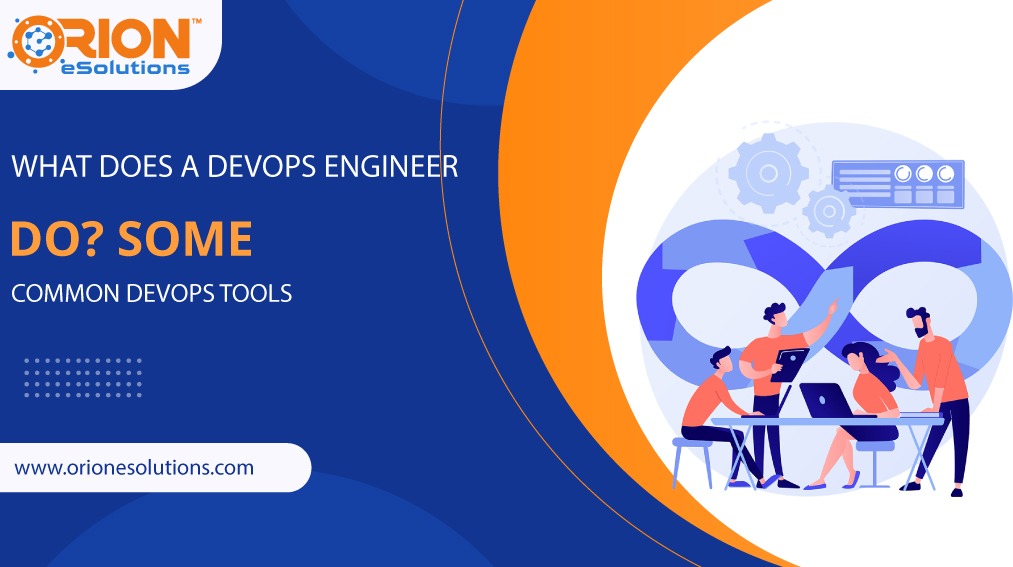DevOps is responsible for improving the workflow and partnership of the development and operations team. A DevOps engineer is in charge of working with the IT developers to bring about better coordination between the operations, development, testing, consultancy, and delivery with the help of automating business processes.
It is aimed at bringing together a better balance between the IT operations and the various businesses. This new way of working is dominantly ruling over the IT companies by a revolution by bringing in new ways to optimize the creation and delivery of software applications.
In this article, we will have a detailed look at all the aspects of what is needed to become a successful DevOps engineer and some of the common DevOps tools. It is generally believed that DevOps is all about automation of the IT processes, code deployment, and software release. However, it is much more than that. The key to becoming a successful and certified DevOps professional is to have a balance of technical and nontechnical skills. Let’s understand all the skills one by one.
WHAT DOES A DevOps ENGINEER STAND FOR?
A DevOps engineer is a person who is supposed to manage the IT infrastructure according to the requirements of the software code developed in a hybrid environment. He/She is responsible for provisioning and getting a suitable deployment model while monitoring and validating the performance.
They are either developers who gained an interest and became good at deployment, network operations or system administrators who have an interest in coding.
THE ROLE OF A DevOps ENGINEER:

When it comes to DevOps, there is a strict need to have regular and improved changes in the code versions in order to control the process of consistent testing and deployment. There is no need for a DevOps professional to code from scratch. However, they must be aware of the basics of software development because there is a frequent need to delegate the new coding process or update the present one.
There will be a need to connect the different elements of coding with the libraries and software development kits. In addition to this, they might also need to connect various components of SQL data management for software release with production infrastructure and operating systems.
Comprehensive knowledge of all the computer programming languages with a detailed understanding of Linux will be extremely beneficial. The professional will have to work with the development staff to control the coding and scripting process. This is why comprehensive knowledge of computer programming languages can prove to be really helpful.
Let us have a look at some of the roles of a DevOps engineer in detail:
- A DevOps Engineer is expected to work with many open source tools and solutions for managing the source codes.
- He/She must have complete knowledge of IT operations in detail while understanding the sysadmin roles. This will help in strategizing the complete integration and the deployment process.
- There should be expertise in the testing and deployment process of software code testing so that the job can be done smoothly.
- A DevOps engineer must deploy multiple automation tools with perfection with a thorough knowledge of the software development automation tools.
- There must be a firm understanding of the agile methodology of project management that will help the DevOps engineer scale up to a whole new level. This agile methodology helps in the continuous integration of software development and testing as well.
- A DevOps engineer must have the ability to connect well with the technical and business goals.
- More than anything, a DevOps engineer must have great communication skills and should be great in handling professional interactions for smooth interaction.
In the present times, the software applications are not created and looked after in a conventional manner. The open-source technologies are ruling in the present time with the use of an already existing piece of code so that the resultant program can adhere to our specific needs. Therefore, the role of a DevOps engineer must evolve and adapt to the new change that is dictating the working of the software development cycles and beyond.
Software applications are primarily created with a need to be fit for the digital world. Since the trends keep on changing; there is a constant need to adapt to them in terms of software applications. Therefore, the code of the software must be adaptable so that it can be changed with the needs of the businesses.
Also, it is important to be updated with the testing and deployment changes in the world so that the results can be delivered at a fast pace.
RESPONSIBILITIES OF A DevOps MANAGER:

- BECOMING AN EXCEPTIONAL SYSADMIN: The responsibility of a Sysadmin or a system administrator is to build, manage and raise concerns to the servers on a consistent basis. Facilitating the work of the servers to work in the right manner is one of the most significant aspects of a professional who is in charge of handling the DevOps process.Also, becoming an exceptional sysadmin can be linked to automating the key processes that are included in the deployment of the servers and the infrastructure.
- COMPREHENSIVE EXPERIENCE IN NETWORK AND STORAGE: Since the very beginning, network and storage have been an integral part of any IT company. Therefore, it is important for a DevOps professional to be able to deploy the acquired knowledge of IT network and storage concepts.This becomes all the more important when it comes to finding optimal design solutions that can stand up through the various tests of scalability, performance and consistent availability at all times.
- DEPLOY VIRTUALIZATION: Another responsibility of a DevOps professional is to be capable of expert virtualization because he/she is supposed to be in charge of handling the complete process of handling the servers and components.He/she must be able to work in a private or public set-up with ease so that the deployment process can be done keeping in mind the necessary infrastructure and virtualization.
- STRONG SOFT SKILLS: This is another primary requirement for a DevOps professional because he/she is responsible for bridging the gap between the development and operations team.Since the DevOps process relies more on technical shifts, there is a requirement to have the right people with the right skills so that they can get the entire organization moving in a well-coordinated manner.There was a time when the success of the project suffered immensely because the development and operations teams always struggled in understanding the requirements of each other. However, this is being changed immensely with the help of a DevOps.
- A FIRM KNOWLEDGE OF CODING CAN BE VERY HELPFUL: Coding is one of those few skills which form the basis of managing the automation processes in the DevOps. Therefore, a strong and firm knowledge of coding in any popular programming languages can go a pretty long way in making the DevOps process much more effective.A firm knowledge of coding assists the DevOps engineer to bridge the gap between the development and operations processes. All the important technological processes, right from server triggering, application installation, validation and configuration processes are automated.This automation is only possible if the coding is done right and it is the responsibility of the DevOps professional to make sure that everything is on track.
- GAINING AN UNDERSTANDING OF AUTOMATION TOOLS: There are many automation tools and technologies that are used for the working of DevOps processes. As a professional, it is important to be aware of them so that the necessary DevOps tool can be deployed for the set-up.Some of the most important tools that are used in the DevOps process are Salt, Puppet, Docker, Nagios, Kubernetes, Jenkins, etc.
- THE SECURITY ASPECTS: Security is a highly sensitive and important factor in every IT organization. It is also the primary focus of a DevOps professional. This is why a DevOps professional must know about the different security measures that must be taken care of to keep the system safe, sound and running most of the time.There are many automation processes that are deployed in the IT organizations and so it is important to take special care of all of them. Maintaining security is one of the most important aspects of DevOps because it also governs the integrity of all other processes.
- PROFICIENCY IN HANDLING TESTING AND DEPLOYMENT: Testing is one of the most significant aspects for making the process of software development success. Therefore, DevOps professionals must understand how the testing works so that the entire process can go in the right direction.There are many automation tools that are deployed in the process of testing and the professionals are supposed to have a good experience of working with all of them to prevent the occurrence of any errors.
TOOLS USED IN THE DevOps PROCESS:

DevOps process includes a lot of development, testing and deployment aspects to ensure that there is a seamless workflow in the CI/CD pipelines. Given below are some of the famous DevOps tools:
- NAGIOS: This is one of the most widely used, open-source and free computer software applications that are used for monitoring systems, networks, and other infrastructure. It sends alerts when there is a problem.
- MONIT: This tool is used for open-source coding in Unix and Linux. It ensures precision and correctness in any condition. With the help of this tool, checking the system directly is possible, right from the command line to the native webserver.
- ELASTISEARCH, LOGSTASH & KIBANA: A collection of open source products, ELK stack helps to take data from any source, analyze and visualize the data in real-time.
- JENKINS: Jenkin is an open-source automation tool written in Java. In addition to being user-friendly, it is easy to understand as well. With the best facility of plugins and addons, it is made for tailored processes.
- PUPPET: This is an open-source programming solution that runs on Unix like frameworks just like Microsoft Windows. Scripted in C++ and Clojure, Puppet has its own definitive language that helps in describing the system arrangement.
- KUBERNETES: This system is used for automatic deployment, management, and scaling of different containerized applications. Made by Google, this tool operates with the help of container tools and offers other useful features as well.
- VAGRANT: Vagrant is an open-source software built for working in a portable virtual software development condition. Written in Ruby, it is one of the most trusted and popular tools.
- DOCKER: It is a computer program that is prevalently utilized to perform operating system-level virtualization, also known as containerization.
- VAULT: This tool secures, controls and stores passwords, certificates, tokens, APIs. This assists in safeguarding applications and their infrastructures.
CONCLUSION:
Given above are all the skill sets that are required to make a DevOps engineer successful. Orion eSolutions has a team of DevOps engineers who are well aware of the Software Development Lifecycle and automation tools which are used for developing CI/CD pipelines.
Being an expert in working with the developers and the IT staff, Orion eSolutions is the best DevOps Development company when it comes to software releases.
Also Read: Guide to DevOps: Phases, Tools, Uses, and Principles









